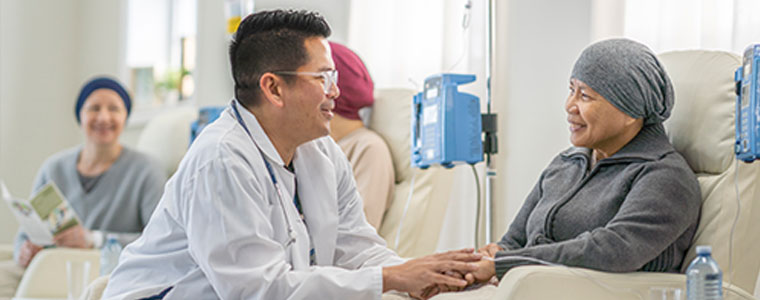Explore Our Trials
Gateway for Cancer Research is one of the only nonprofits that exclusively funds innovative Phase I and Phase II cancer clinical trials for patients of all ages, regardless of cancer type. At the forefront of research and discovery, these early-phase trials are the first step in evaluating new cancer drugs, treatments, and therapies.
Breast Cancer
Protein Pathway Activation Profiling of the ISPY-2 Trial
Protein Pathway Activation Profiling of the ISPY-2 Trial Summary: For women with newly diagnosed Stage II/III breast cancer, achieving a complete pathological response in the neoadjuvant setting is one of the single most important therapeutic outcomes that can be obtained. Patients who achieve it have 7 to 10 years distant relapse-free survival rates over 90% […]
Emanuel Petricoin, PhD
George Mason University
Colorectal Cancer
Phase II Clinical Trial of FOLFOX, Botensilimab, Plus Balstilimab in Patients with Localized Rectal Cancer
Phase II Clinical Trial of FOLFOX, Botensilimab, Plus Balstilimab in Patients with Localized Rectal Cancer Summary: In recent years, there has been an increased focus on non-operative management in patients with rectal cancer experiencing complete responses with total neoadjuvant therapy. However, despite aggressive approaches, only 50% of patients achieve a complete clinical response. Thus, there […]
Marwan Fakih, MD
City of Hope
Solid Tumors
Enhancing Inclusivity: Community-Focused Decentralization Of Avapritinib Phase 2 Basket Study For Improved Access And Community Engagement
Enhancing Inclusivity: Community-Focused Decentralization Of Avapritinib Phase 2 Basket Study For Improved Access And Community Engagement Summary: Randomized clinical trials are the gold standard for clinical research and remain the most robust method for assessing the efficacy and safety of new therapeutic interventions. However, patients often must travel to academic centers, where investigators, diagnostics tools, […]
Blessie Elizabeth Nelson, MD, DMRT
MD Anderson Cancer Center
Pediatric Blood Cancer
Pedi-cRIB: Overlapping Immunotherapy and Chemotherapy for Relapsed Leukemia
Pedi-cRIB: Overlapping Immunotherapy and Chemotherapy for Relapsed Leukemia Summary: Despite notable advances in bringing immunotherapy to pediatric B-cell Acute Lymphoblastic Leukemia (B-ALL), the most commonly used treatment regimen for relapsed disease (ALLR3) still results in the death of 2% of patients and a severe infection rate of 90%. Among responders, 38% still had detectable disease […]
David McCall, MD
MD Anderson Cancer Center
Blood Cancer
OPTIMIZE A Phase II Study of Reduced Dose Post Transplantation Cyclophosphamide as GvHD Prophylaxis in Adult Patients with Hematologic Malignancies Receiving HLA-Mismatched Unrelated Donor Peripheral Blood Stem Cell Transplantation
OPTIMIZE A Phase II Study of Reduced Dose Post Transplantation Cyclophosphamide as GvHD Prophylaxis in Adult Patients with Hematologic Malignancies Receiving HLA-Mismatched Unrelated Donor Peripheral Blood Stem Cell Transplantation Summary: Allogeneic hematopoietic cell transplantation (HCT) is a potentially curative therapy for many hematologic disorders. The best outcomes are associated with the use of an HLA-matched […]
Jeffery Auletta, MD
NMDP/Be The Match
Colorectal Cancer
Botensilimab and Balstilimab Optimization in Colorectal cancer (BB-OPCO)
Botensilimab and Balstilimab Optimization in Colorectal cancer (BB-OPCO) Summary: Eighty-five percent of colorectal cancer (CRC) are Microsatellite stable (MSS). MSS CRC has had limited response to conventional immune checkpoint inhibitors (ICIs), especially those with liver metastasis. ICIs work by blocking cancer cells’ ability to hide themselves from cancer killing T-cells by targeting PD-1/PD-L1 and CTLA-4. […]
Nicholas DeVito, MD
Duke University
Blood Cancer
Prebiotic fibre supplementation during haematological cancer treatment
Prebiotic fibre supplementation during haematological cancer treatment Summary: Research indicates that the diversity of bacteria in the gastrointestinal tract decreases rapidly during initial leukemia treatment and remains low through stem cell transplantation. Low GI microbiome diversity is associated with more infections and higher mortality post-stem cell transplantation. Furthermore, intestinal permeability increases after chemotherapy treatment which […]
Sarah Andersen, PhD, ADV APD
Royal Brisbane and Women's Hospital
Bladder Cancer
Neoadjuvant Futibatinib plus Durvalumab in Muscle Invasive Bladder Cancer
Neoadjuvant Futibatinib plus Durvalumab in Muscle Invasive Bladder Cancer Summary: Bladder cancer is the 6th most common cancer in the US with about 81,000 new cases annually. Approximately 30% of patients present with muscle-invasive bladder cancer (MIBC) and these patients have an increased risk of nodal and distant metastasis. The standard of care is cisplatin-based […]
Yuanquan Yang, MD, PhD
The Ohio State University
Stomach Cancer
A phase II trial of defactinib and VS-6766 in diffuse gastric cancer
A phase II trial of defactinib and VS-6766 in diffuse gastric cancer Summary: Globally there are over 1 million cases and nearly 780,000 deaths from gastric cancer each year. The long-term survival rates for patients with advanced disease remain abysmal with less than 5% alive at 5-year from diagnosis. There are currently no therapies for […]
Ryan Moy, MD, PhD
Columbia University
Brain Cancer
RMC-5552 in Adults with Recurrent Glioblastoma
RMC-5552 in Adults with Recurrent Glioblastoma Summary: Despite current treatment with surgery, radiation, and chemotherapy, glioblastoma (GBM) will inevitably recur within 6 to 13 months of treatment. The median survival from recurrence is approximately 9 months. Furthermore, there is no standardized established therapy for progressive GBM. To address the dismal prognosis of patients with recurrent […]
Nicholas Butowski, MD
University of California, San Francisco

